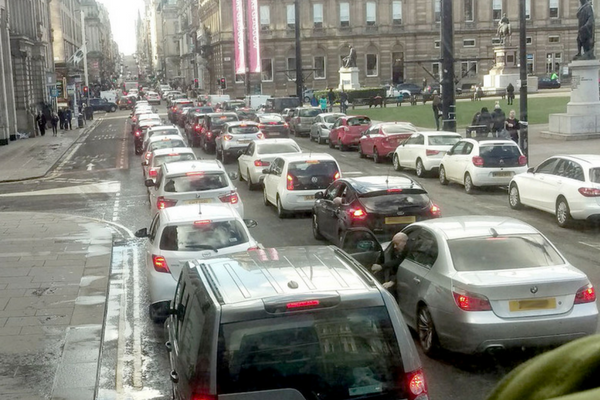
Traffic stats show transport challenge
Responding to the Scottish Transport Statistics published, Friends of the Earth Scotland’s Air Pollution Campaigner Gavin Thomson said:
“The new statistics show that in the year running up to the pandemic road traffic increased to record levels, with car-kilometres up 1% on the year before, while bus journeys decreased by over 3%. This continues the long-term trend, with car traffic increasing nearly 7% and bus journeys falling by nearly 12% over the last five years.
“While the distance driven by cars increased 10% over the last decade we have a new Scottish Government target to reduce them by 20% over the next decade. The pandemic brought huge changes in Scotland in the way we travel as in every other aspect of life and we should use those changes to break the dominance of cars in our society.
“It’s too early to guess exactly what transport will look like after Covid, but we have already seen significant changes that could have lasting consequences. There’s been an unprecedented increase in cycling across Scotland, for key worker commutes and for exercise. The ‘Spaces for People’ initiative has been very effective in easing social distancing by widening pavements and creating pop up cycle lanes.
“The increase in working from home and use of video conferencing could prove to be enduring changes that significantly reduces commuting. Even the AA has suggested public spending could be diverted from new road construction into broadband provision to address this societal change. This makes a great deal of sense, because there might be a sustained reduction in journeys across all transport modes, and an increased need for reliable internet coverage.
“Ultimately we’re dealing with twin crises of climate change and Covid-19, and public transport has an essential role to play in tackling both. We urgently need to reduce emissions, move away from fossil fuel car use, and create communities where walking and cycling are the easy, safe, default options for people”
Key statistics:
- Total greenhouse gas emissions from transport made up 36.5% of all Scotland’s emissions in 2018, a decrease of 1% on 2017, with transport the largest sector of emissions
- Road transport accounts for 64% of transport greenhouse gas emissions.
- 36.7 billion kilometres were travelled by car in 2019-20, up 1% from the previous year and up 6.5% over the last 5 years.
- Around 366 million passenger journeys were made by bus in Scotland in 2019-20. This is a decrease of 3.2% on 2018-19. Bus journeys have almost halved since 1975.
- 66% of households living in the most deprived areas do not have access to a car, highlighting the need for reliable, affordable public transport to address inequality.
Friends of the Earth Scotland revealed last month that the reduction in traffic due to the pandemic had led to cleaner air across Scotland, with no locations showing illegally high levels of dangerous air pollution.
Notes to Editors
1. The 2020 Scotland Transport Statistics published today (24/2/20) can be viewed here: https://www.transport.gov.scot/media/49177/scottish-transport-statistics-2020-publication-final-version.pdf
2. Friends of the Earth Scotland recently published data showing that air quality monitoring sites around Scotland had met legal standards for the first time because of COVID https://foe.scot/press-release/covid-19-restrictions-scotland-meets-air-pollution-legal-limits/
3. Friends of the Earth blog on the 20% traffic reduction target https://foe.scot/tackling-traffic-where-we-need/
4. Friends of the Earth Scotland is:
- Scotland’s leading environmental campaigning organisation
- An independent Scottish charity with a network of thousands of supporters and active local groups across Scotland
- Part of the largest grassroots environmental network in the world, uniting over 2 million supporters, 73 national member groups, and 5,000 local activist groups.
